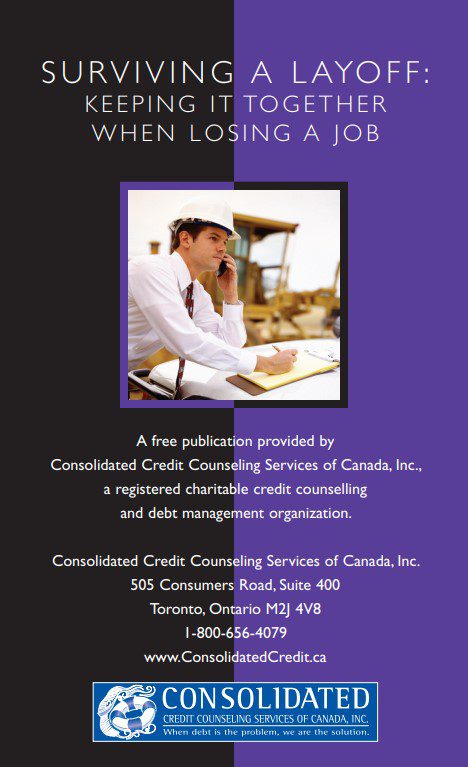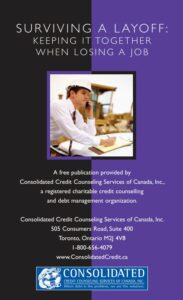
Surviving a Layoff
Losing a job is one of life’s most stressful events. There are both practical and emotional impacts to losing a job. On the practical side, you are faced with how you will pay your bills and find a new job. On the emotional side, you may feel ashamed, betrayed or angry that you’ve lost your job. It is easy to become overwhelmed and take actions that may affect you for years to come. This booklet is prepared to help you with these kinds of problems.

Congratulations on taking this important step to a brighter financial future. Consolidated Credit Canada has been helping Canadians across the country solve their credit and debt problems for years.
Our Educational Team has created over twenty-five publications to help you improve your personal finances. By logging onto www.consolidatedcreditcanada.ca you can access all of our publications free of charge. We have tools to help you become debt-free, use your money wisely, plan for the future, and build wealth. The topics Consolidated Credit Canada addresses range from identity theft to building a better credit rating; from how to buy a home to paying for university. On our website, you will also find interactive tools that allow you to calculate your debt and see how much it is costing you.
We are dedicated to personal financial literacy and providing a debt-free life for Canadians. If you are overburdened by high-interest rate credit card debt, then I invite you to speak with one of our trained counsellors free of charge by calling (844)-402-3073 for free professional advice.
Sincerely,
Jeffrey Schwartz
Executive Director
Consolidated Credit Canada.
Surviving A Layoff
Keeping it Together When You Lose A Job
Losing a job is one of life’s most stressful events. There are both practical and emotional impacts to losing a job. On the practical side, you are faced with how you will pay your bills and find a new job. On the emotional side, you may feel ashamed, betrayed or angry that you’ve lost your job. It is easy to become overwhelmed and take actions that may affect you for years to come.
On the other hand, in the long run, losing your job may open the opportunity for you and your family to pull together, do some of the financial planning you’ve been putting off, and perhaps find better paying or more satisfying work.
Financial Strategies
Many people underestimate the time it will take to recover financially from a job loss. They continue with their current spending, often using credit cards to fill in the gaps. Those debts can quickly add up and become unmanageable if it takes longer than expected to regain employment at your previous pay.
Here are some financial steps you need to take to protect yourself during a job loss:
1. Find out whether you are entitled to employment insurance benefits, and if so, how much. Visit www.hrsdc.gc.ca and you will find all topics pertaining to employment insurance and how it works.
2. Check your benefits. Find out what kind of severance you may get, whether you can keep the money you’ve accrued in a company retirement plan where it is, whether your company will offer job placement or resume writing assistance, and whether you have unpaid overtime or vacation pay that you’ve earned. If you aren’t leaving on negative terms, you should at least ask your supervisor for a reference letter and some suggestions for your job search.
3. Make a budget. This can be a real chore when things are good, much less when you are under the stress of a smaller income. But if you don’t have a good sense of what your monthly expenses are, it’s very easy to quickly run up a lot of debt. Visit Consolidated Credit’s Learning Centre, www.consolidatedcreditcanada.ca, for a free budgeting guide.
4. Create a plan for your bills. If you believe you will have trouble making the payments on your bills, get help sooner rather than later. If you wait too long you may make mistakes that lead to bankruptcy. You can try calling your creditors to work out a lower payment arrangement on a temporary basis but keep in mind that if your unemployment stretches out longer than you expected, they may not be sympathetic. It can be very helpful to get the assistance of a non-profit credit counselling agency like Consolidated Credit, which can work with your creditors on your behalf so you can focus on your job search.
5. Make contingency plans. While it may be difficult to think about, consider your contingency plans if you can’t find a job soon at your old salary. Do you have assets you could sell (a boat, or an extra car, for example?) Could you downsize to a less expensive home? Do you have a cash value life insurance policy you could tap? Just be careful that you don’t wipe out everything you own without getting a professional review of your options. Raiding your retirement funds or tapping your home equity to pay the bills may seem like a good idea at the time, but if your job loss extends longer than you expected you could end up with nothing to fall back upon.
6. Get creatively frugal. Look at each expense and see where you can make changes until you’re back on your feet. Eating out, for example, may seem like a necessity when you are busy working but could be stopped while you have more time to shop and cook. In Consolidated Credit’s Learning Centre, you’ll find several free brochures to help you cut costs in common budget areas like food, vehicles, and energy.
7. Ask for help. Many people who have worked hard all their lives are ashamed to ask for help from government and community agencies when they need it. Don’t be. You pay for that help when you are working through your taxes and the money you give to support charitable organizations. Find out what resources are available in your community and get the help you need.
8. Temp it. Temporary work may not be your first choice, but it can help pay the bills. If you treat it like a “real job” you may even be asked to stay on after your assignment is over. The best part about temping is that you get to try out different employers and jobs without making a long-term commitment.
9. Understand your options. Learn what your options are if you can’t make your house or car payment. You should always talk with your creditors before you fall behind, but understanding what can happen in those situations may help alleviate the fear of the unknown. Visit Consolidated Credit’s Learning Centre for free brochures that explain these topics.
Job Search Strategies
1. Review yourself. You’ve had job evaluations in the past. Now it’s time for you to evaluate yourself. What are your skills? What have you most enjoyed in your past jobs? What didn’t you like? What would you like to do more of? Spending some time in reflection may help you think of new jobs or careers you’d like to try.
2. Prepare the paperwork. You’ll likely be filling out a lot of applications, so gather your information together. Where did you work, and when? What were your job duties and accomplishments? You may want to put all this information together, perhaps in a resume format, so you’ll have it if you need it.
3. Review your credit report. Several free brochures in Consolidated Credit Canada’s Learning Centre will help you understand credit reports and scores, and fix mistakes.
4. Keep your eyes open. Personal references are the best way to find and get a job. So contact everyone you know for ideas and suggestions of potential jobs and employers. Ask if you can use their name when contacting a referral, and don’t forget to thank them afterward.
5. Go on a hunt. Look for jobs online, in your local newspaper, and through local employment agencies.
6. Visit the library. Your local library should have a large number of books that can be helpful for everything from writing a resume to figuring out what you want to do next. Changing Careers for Dummies by Carol McClelland and Cool Careers for Dummies by Marty Nemko are just two examples.
Be Smart!
Be very careful about providing personal information to a prospective employer over the Internet. Some identity thieves have used fake job openings to gather information about consumers. These job postings can appear very legitimate so be careful. Before you provide personal information over the Internet, call the company through a published number and verify that the job posting is legitimate.
7. Prepare for job interviews. Choose the clothing you want to wear to interviews and ask for feedback from family members or friends. Practice answering interview questions. Pull together documents you’ll need (generally your driver’s license and Social Insurance card).
8. Consider a career change. If you worked in an industry that is declining or sending jobs overseas, you may want to consider a career change. Before you do, however, see if you can find a way to work or intern in some capacity in that new field. You don’t want to spend two years becoming a medical assistant, for example, only to learn you don’t like working with patients!
9. Start your own business. Your own business could be a way for you to shift gears and earn good money doing what you choose to do. But it’s also very risky. Most new businesses don’t make it through the first two years. So if you are going to start a new business, choose one with a solid track record and get advice from others with experience. Consider temping and starting your business on the side until it takes off. Unless you have plenty of money in savings and investments, now is not the time to take a chance on an unproven idea.
Coping Strategies
Losing a job ranks near the top of the list in terms of stressful life events. It’s easy to say that you should stay positive while you’re looking for a new job, but doing that is another matter. Work is a major part of our identities, and not having a job can be frightening.
1. Take it easy on yourself. Losing a job is traumatic. In many ways, it can be more exhausting and stressful than when you were working. Understand that it’s normal to feel a wide range of emotions including a sense of helplessness, fear about the future, and resentment toward friends and family who “don’t understand.”
2. Get help. Talk to your doctor or a mental health professional if you’re experiencing panic attacks, anxiety, or depression. Don’t assume you should just “snap out of it.” You may need outside help. If you are withdrawing from family members or loved ones, or find yourself frequently fighting or arguing with them, get help.
3. Help your children. If you have children, they may pick up on a lot more than you realize. Talk with them openly about what happened, answer their questions, and let them know it’s your job to take care of the family. There are a few books that can be helpful in talking to your children, including My Mother Lost Her Job Today by Judy Delton or When a Parent Loses a Job: A Workbook About My Parent’s Job Loss by Denise McNaught.
4. Develop a routine. Give yourself a reason to get up in the morning. Set a schedule for researching jobs and making phone calls. Get out to network with others. Avoid the trap of finding busy work to fill your days if it means avoiding the job search you’re dreading.
5. Exercise. Do something (inexpensive) that you enjoy but perhaps have been putting off because you were too busy to do it. Walking, biking or gardening can all be good for relieving stress and keeping you healthy.
6. Don’t dump it on your spouse. If you have a spouse or partner, don’t expect them to provide 100% of your moral support. Keep the lines of communication open, but realize you may need to find another person who understands what you’ve been through. They may be grieving and scared, too.
7. Join a support group. Getting together with other people who understand what you are experiencing can be very helpful. Check with your local government or look online. The Riley Guide (www.rileyguide.com), for example, offers a list of support groups both locally and on the Internet.
Additional Resources:
Advice and Links to Career Resources:
www.RileyGuide.com and careerplanning.about.com are especially helpful.
Cutting Costs: You’ll find numerous money-saving strategies at www.goodadvicepress.com
https://www.canada.ca/en/services/benefits/ei.html is the government website for employment insurance.
At www.craigslist.com and www.linkedin.com, you will find everything from support groups to job openings in many local and international regions.
About Consolidated Credit Canada
Consolidated Credit Canada is a consumer-oriented, non-profit organization. We are an industry leader in providing credit counselling and debt management services. Our mission is to assist individuals and families in ending financial crises and to help them solve money management problems through education, motivation, and professional counselling. Our organization is funded primarily through voluntary contributions from participating creditors. Our programs are designed to save our clients money and liquidate debts at an excellent rate.
We are dedicated to empowering consumers through educational programs that will influence them to refrain from overspending and abusing credit cards, as well as to encourage them to save and invest. Regardless of whether your financial problems are due to the purchase of a new home, the birth of a child, major illness, or any other circumstance, we can help.
* If you are headed for a debt disaster visit www.ConsolidatedCreditCanada.ca or call (844)-402-3073 for free professional advice by a trained counsellor.




